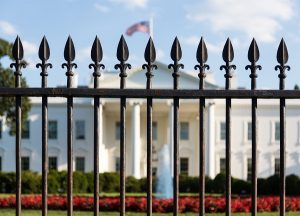
The White House’s situation room may be the most well-known SCIF but there are others as well.
SCIF stands for Sensitive Compartmented Information Facility, which is a secure place in which sensitive information is able to be viewed, discussed, and kept safe from outside surveillance. If you’re thinking the White House’s situation room, you’re on the right track: it’s likely the most famous SCIF, where classified military and foreign policy decisions have long been made. These areas are intended to only allow access to individuals with the appropriate security clearances so it’s critical that they invest in top-notch security measures.
How Are SCIFs Established?
There are a few strict guidelines laid out by The Office of the Director of National Intelligence as to what goes into a SCIF. Essentially, designs are engineered so that any electro-magnetic signals (the kinds emitted by phone systems, cellular, even computers) are shielded in a sophisticated way so that there is no eavesdropping possible. This includes an effort to minimize, or even eliminate, windows in the SCIF. It also places an emphasis on acoustic protection, including soundproofing or, if unavailable, speakers can be used to funnel in noise (noise masking) that masks the conversations within the SCIF. Some SCIFs, like the situation room, are permanent, while others are temporary and even mobile. Sometimes, presidential hotel rooms or immediate surroundings become SCIFs while government officials travel.
How Are They Used?
SCIFs are used for establishing a secure space to discuss sensitive information. Historically, there has been one in the White House, but they’ve also been utilized elsewhere. For example, NBC reports that President George W. Bush’s ranch in Crawford, Texas, contained a trailer that was converted into a SCIF. Similarly, Hillary Clinton reportedly told Congress that during the Benghazi investigation, her home in D.C. had a SCIF. These are essential spaces for national security and protecting our nation from potential surveillance efforts.
What Security Measures Are There?
Non-cleared personnel who enter an SCIF are under constant oversight of security forces. All classified information and material must be removed from their view in an attempt to prevent unauthorized and undesired access. These non-cleared personnel are also usually required to surrender any recording, photographic, or other electronic devices. Some SCIFs may also utilize audio and visual systems to monitor the security of the space.
Get in Touch with FiberPlus
FiberPlus has been providing data communication solutions for over 25 years in the Mid Atlantic Region for a number of different markets. What began as a cable installation company for Local Area Networks has grown into a leading provider of innovative technology solutions improving the way our customers communicate and keeping them secure. Our solutions now include:
- Structured Cabling (inside and outside plant)
- Electronic Security Systems (Access Control & CCTV Solutions)
- Distributed Antenna Systems
- Public Safety DAS
- Audio/Video Services (Intercoms and Display Monitors)
- Support Services
- Specialty Systems
- Design/Build Services
FiberPlus promises the communities in which we serve that we will continue to expand and evolve as new technology is introduced within the telecommunications industry.
Have any questions? Interested in one of our services? Call FiberPlus today 800-394-3301, email us at info@fiberplusinc.com, or visit our contact page. Our offices are located in the Washington, DC metro area, Richmond, VA, and Columbus, OH. In Pennsylvania, please call Pennsylvania Networks, Inc. at 814-259-3999.
Do you enjoy clicking “Like” and “Follow?” Be sure to click on our official Google+, Pinterest, Facebook, Twitter, and LinkedIn pages today!